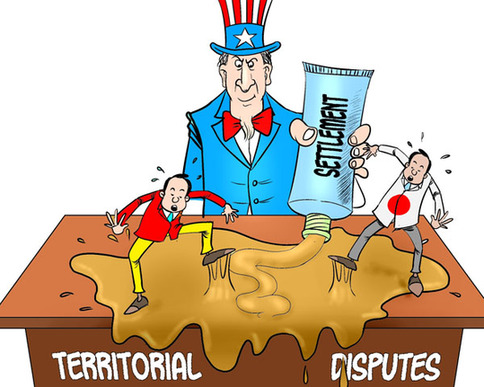Diaoyu issue gets more complex
- By Liu Qiang
 0 Comment(s)
0 Comment(s) Print
Print E-mail China Daily, September 10, 2013
E-mail China Daily, September 10, 2013
The dispute between China and Japan over the Diaoyu Islands intensified after the Japanese government decided to "purchase" them last year. Japan insists there is "no dispute", which has escalated tensions between the two countries.
|
 |
|
Sticky solution [By Jiao Haiyang/China.org.cn] |
Because of the Diaoyu Islands dispute, China-Japan relations have become more complicated and could have a serious impact on security and stability in East Asia. So it is in the interest of both countries to properly deal with the Diaoyu Islands issue and prevent their relations from deteriorating further. Doing so would also help establish long-term stability in the region.
To peacefully resolve the issue, Japan has to understand the nature of the Diaoyu Islands dispute and should not rely on US support to counter China's claim over the islands.
But instead of doing that, the Japanese government made the irrational decision last year to "purchase" the Diaoyu Islands. After many fruitless protests and diplomatic negotiations with Japan, China began dispatching its ships on sovereign cruise in the waters off the Diaoyu Islands, and made the practice routine over time. Since Japan, too, has taken more actions trying to strengthen control over the islands, there have been some frictions between the two sides.
The Japanese government's decision to "purchase" the Diaoyu Islands is nothing but a farce. It's the outcome of its deep-rooted expansionist policy with the connivance of right-wing forces. The Japanese government's decision to "purchase" the islands is also aimed at tiding over its survival crisis.
There is no denying that Japan's actions reflect its arrogance and total disregard for history, and it is trying to use the Diaoyu Islands issue to overcome the hurdles on the path to becoming a "normal country".
Since last year Japan has also had frictions with other countries over territorial disputes, and tried to acquire the right to collective self-defense and dispatch its self-defense forces on overseas military missions.
It cannot be said with certainty that Japan has already taken the path of militarism. But if right-wing Japanese politicians continue distorting history and ignoring peaceful development, they could possibly revive militarism.
The Diaoyu Islands issue is critical to future China-Japan ties. If not properly handled, it could trigger a major conflict between the two sides.
In the not so distant past, Japan admitted that the sovereignty of the Diaoyu Islands was disputed. But now it claims that there is "no dispute", which is unacceptable to China.
Ironically, Japanese Prime Minister Shinzo Abe has allocated more funds for the propaganda battle over the Diaoyu Islands despite having said that he wants Chinese and Japanese leaders to discuss the issue. It's hard to imagine China and Japan achieving any positive result under such circumstances.
With the support of the US, Japan will continue to take measures to contain China over the Diaoyu Islands and other issues.
Since the Diaoyu Islands issue has harmed China-Japan economic relations and some Japanese enterprises have suffered its consequences, Japan has started tapping other overseas markets to make up for the loss. Japan is likely to toughen its stance over the Diaoyu Islands once it manages to reduce its dependence on the Chinese market. And the day that happens, China-Japan relations will hit a historic low.
Given these facts, China has to take stronger measures to safeguard its sovereignty over the Diaoyu Islands. The Diaoyu Islands are an integral part of China's territory, and sovereignty and territorial integrity are paramount for any state. The Chinese government and people have to be more resolute in defending China's sovereignty over the Diaoyu Islands, because confrontation between China and Japan over the issue looks imminent, although it is not desirable.
A China-Japan military conflict over the islands dispute cannot be ruled out. The complex nature of the Diaoyu Islands dispute and Japan's hardened attitude have made a peaceful resolution difficult to achieve.
The Chinese government and people do not want an armed conflict to resolve the issue, but they will not shy away if they are forced into one. As things stand now the islands dispute could permanently damage China-Japan relations.
The author is a professor at International Security Research Center, affiliated to PLA International Relations University.






Go to Forum >>0 Comment(s)